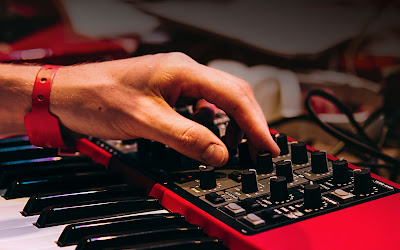Writing music can be a challenging process for any composer.
Especially when you consider the amount of time and effort that is required to
create a piece of music.
Musicians, songwriters, arrangers, producers, or anything in
between, have undoubtedly experienced times when they were stuck, unable to
produce, and hated everything they did. In many cases, these periods of
stagnation are referred to as "writer's block"; however, writer's
block doesn't exist in reality. The real problem is procrastination and fear.
If you are having trouble creating, these are the areas you
can focus on that will get you back into the groove.
In this article, Canadian music composer Andrew Huggett is
going to discuss how you can get back into the groove so that you can finish
your composition before deadline.
Limit Your Options
Many people find the idea of infinite possibilities to be
terrifying! An overload of information causes us to feel overwhelmed by too
many options. According to a commonly shared study, less choices result in
greater forward momentum for jam sales. Composing music is about making
choices. Andrew Huggett suggests making
early choices, starting with overall concepts and moving closer and closer to
details.
Change your environment and routine
Make a regular practice of changing your environment and
routine. One of the best ways to overcome a creative block for music composing
is to experiment with different composing styles. If you are used to writing in
a specific way, try changing your routine and seeing what happens. Some
composers find it helpful to write in a specific time zone so that they can
switch between two different writing styles and approach different types of
material.
Some composers find it helpful to record themselves as they
compose. This can be a great way to hear yourself think as you create. It can
also be helpful to write out a piece of music while you are listening to it. If
you find it difficult to write while listening to a piece of music, write it out
the first time you hear it. This will force you to pay attention to what is
happening in your head and you will notice how it relates to the music.
Take Breaks
When you are stuck on a piece of music and you feel like you
cannot go on, try taking breaks. This is the perfect time to clear your mind,
refocus, and try again with a new idea. If you are really stuck and you are
really worried that you will never get it right, try changing things up. If you
find it difficult to take breaks and you are stuck for hours or days, try to
define your problem areas so that you can tackle them head-on. You can also try
writing down what emotions you are experiencing while you compose.
Ask for help
If you are working on a tight deadline and can't overcome
your writers block with the above tips, then don't be afraid to invite a
colleague to collaborate with you on your song. Choosing a co-writer is,
however, a very important step. You should ensure that he or she will bring in
what you feel is lacking and give your project the attention it deserves,
explains award-winning musician Andrew Huggett.
Combine, Create, Experiment
When you are stuck on a track and you feel like you cannot
move forward, try combining different techniques or creating a brand new piece
of music. If you are not comfortable putting new music out into the world, try
to use what you know best. This might require you to change your sound style,
but it will help you progress as a composer in a way that is meaningful to you.
One final idea that Andrew Huggett believes will help you
overcome your writer's block for music composing is to experiment with
different notes and scales. You can try altering the key of a composition, the
dynamics, or even the tempo without changing the melody at all. This can allow you
to play with different techniques and build new sounds that are quite creative
and challenging.
Conclusion
In order to overcome a creative block, you must approach it
with an open mind. Try to look at it as an opportunity to grow as a composer
and make new music. Get out of your shelf and allow your creativity to flow. If
you feel stuck on a certain track, try changing keys, dynamics, or even the
tempo. There might be a solution to your problem that you just haven't found
yet.





No comments:
Post a Comment